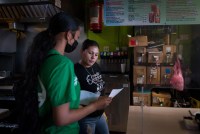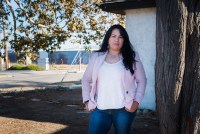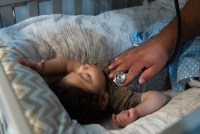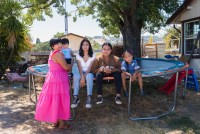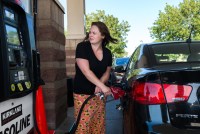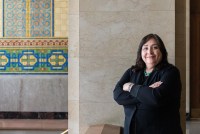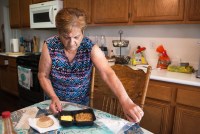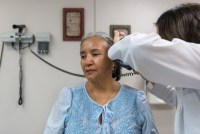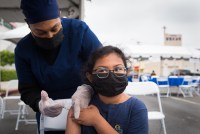Latino Teens Are Deputized as Health Educators to Sway the Unvaccinated
Some community health groups are training Latino teens to conduct outreach and education, particularly in places where covid vaccine fears linger.
Adolescentes latinos se entrenan para educar sobre las vacunas contra covid
Organizaciones comunitarias de salud en California y en todo el país forman a adolescentes, muchos de ellos latinos, para que actúen como educadores de la salud en la escuela, en las redes sociales y en las comunidades donde persiste el miedo a la vacuna contra covid.
Líder de justicia ambiental dice que la Proposición 30 ayudaría a limpiar el aire en zonas en riesgo
Ana González creció viendo cómo Inland Empire se transformaba de plantaciones de cítricos y viñedos en almacenes y centros de distribución minorista. Ahora es una zona en alto riesgo ambiental.
Environmental Justice Leader Says Proposition 30 Would Help Struggling Areas Clear the Air
Ana Gonzalez, who leads an environmental justice group in the Inland Empire, has endorsed Proposition 30, a ballot initiative backed by the ride-hailing company Lyft that would tax millionaires to fund zero-emission vehicle subsidies and electric charging stations. She contends most state policies overlook marginalized communities that are disproportionately affected by air pollution.
Shift in Child Hospice Care Is a Lifeline for Parents Seeking a Measure of Comfort and Hope
Terminally ill children, unlike adults, can get hospice services while continuing to receive life-extending or curative care. More than a decade after the inception of the federal policy, it is widely credited with improving the quality of life for ailing children and their families, even as some parents find themselves in a painful stasis.
Niños del norte de California aprenden a lidiar con el trauma que dejan los incendios
A medida que los incendios forestales de California se vuelven más intensos, frecuentes y generalizados, muchos niños que los sobreviven experimentan traumas psicológicos duraderos, como ansiedad, depresión y trastorno de estrés postraumático.
Children in Northern California Learn to Cope With Wildfire Trauma
Doctors and health officials say more children in the state are growing up with wildfire, which can cause stress, depression, anxiety, and other lasting trauma. Experts say there are ways to help kids stay calm.
Pero, a diferencia de los centros de salud comunitarios, los semejantes no reciben una subvención federal anual para cubrir los costos operativos. Tampoco obtienen la cobertura económica del gobierno federal para casos de negligencia médica.
Para las familias médicamente vulnerables, la presión de la inflación es inevitable
Para millones de familias que viven con enfermedades crónicas, trastornos cardíacos, diabetes y cáncer, u otras condiciones debilitantes, la inflación está demostrando ser un doloroso flagelo que podría perjudicar su salud.
For Medically Vulnerable Families, Inflation’s Squeeze Is Inescapable
Inflation hasn’t hit Americans like this in decades. And families living with chronic diseases have little choice but to pay more for the medicine, supplies, and food they need to stay healthy.
El calor extremo puede causar calambres, agotamiento por calor e insolación. El calor extremo contribuyó a la muerte de unas 12,000 personas en Estados Unidos cada año entre 2010 y 2020, según un estudio de la Universidad de Washington. Es probable que esas cifras aumenten.
LA’s First Heat Officer Says Helping Vulnerable Communities Is Key to Achieving Climate Goals
Los Angeles taps Marta Segura, director of the city’s climate emergency mobilization office, as its first heat officer. Segura, the first Hispanic person to hold such a position in the country, will work across city departments on an early warning system while developing cooling strategies.
His-and-Hers Cataract Surgeries, But His Bill Was 20 Times as Much
Whether a simple operation is performed under the auspices of a hospital or at an independent surgery center can make a huge difference in cost.
Tacos y pollo al curry: Medi-Cal ofrece comidas preparadas en un experimento de atención médica
El programa ayuda a personas con diabetes y otras afecciones a comer más sano y a aprender sobre alimentos saludables. Busca mejorar la salud y reducir costos en atención médica.
Taco Bowls and Chicken Curry: Medi-Cal Delivers Ready Meals in Grand Health Care Experiment
California has embarked on an ambitious five-year initiative to improve the health of its sickest Medicaid patients by introducing nontraditional services. In the Inland Empire, where many residents have diabetes, one health plan is diving into the experiment by delivering healthy, prepared meals to those lucky enough to get them.
California abre el Medi-Cal a adultos mayores indocumentados
El estado vuelve a ser pionero en su esfuerzo porque todos tengan seguro de salud, más allá de su estatus migratorio.
California Opens Medicaid to Older Unauthorized Immigrants
Starting May 1, low-income unauthorized immigrants over age 49 became eligible for full Medicaid health coverage, a significant milestone in California’s effort to expand coverage.
Se desploma la asistencia a eventos de vacunación contra covid en Los Ángeles
A medida que las infecciones por covid han ido disminuyendo, también lo ha hecho el interés en las vacunas, a pesar de que estas dosis son altamente efectivas para evitar enfermarse de gravedad y morir a causa del virus.
Attendance Plummets at LA Covid Vaccination Events
Across Los Angeles County, few people are showing up at covid vaccination drives even though nearly 2 million residents remain unvaccinated.
Sharing Covid Vax Facts Inside ICE Detention, One Detainee at a Time
Thousands of ICE detainees nationwide have tested positive for covid; 11 have died. Medical providers in California are volunteering to educate immigrants awaiting trial or deportation about covid treatment and vaccination.



